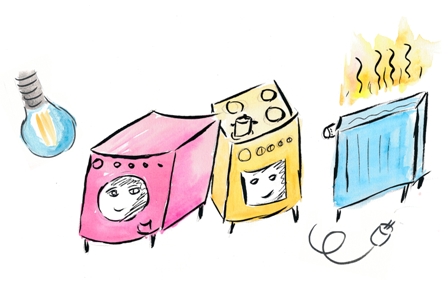
Module 4 - Household energy
Introduction - Easy Ways to Help the Planet in Your Home
Why Your Home Matters:
Your home is a place where you can make a big difference for the environment. Many things you do at home can help save energy, reduce waste, and keep our Earth healthy.
In this module, you will find useful tips to make your home more eco-friendly. By following these simple tips, you're not only making your life better but also helping protect our planet for your kids and grandchildren.
You will find tips for saving energy for these areas:
- Heating
- Shower and bath
- Refrigerator
- Deep freezer
- Dishwashing
- Laundry
- Lighting
- Cooking
- Household electronics
1. How to keep warm and save energy
Why Saving Energy Matters:
First, let's talk about why it's essential to save energy. Energy makes our homes warm, lights up our rooms, and cooks our food. But, the production of energy often creates pollution, which is bad for the Earth. By using less energy, we can help reduce pollution and keep our planet healthy. 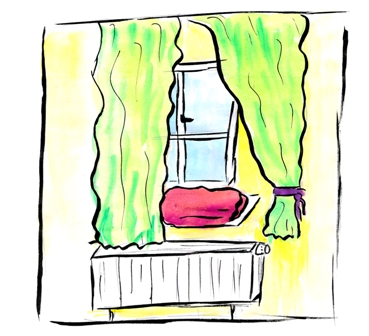
Now, let's explore some simple ways to stay warm and cozy without using too much energy:
- Dress warmly: When it's cold, wearing warm clothes like sweaters, socks, and cozy blankets is a great way to stay warm without cranking up the heat.
- Keep doors and windows closed: Make sure to close doors and windows tightly to keep the warm air inside. This way, you won't need to use as much energy to heat your home.
- Let the sun help: When the sun is shining, open your curtains or blinds. Sunlight can warm up your rooms naturally, and it's free!
- Use draft stoppers: If you feel cold air sneaking in under doors, you can use draft stoppers or even rolled-up towels to keep the chilly drafts out.
- Bundle up at night: When it's bedtime, snuggle under warm blankets. You can turn down the heat a bit while you sleep.
- Seal any leaks: If you find any gaps or cracks in windows or doors, use weatherstripping to seal them up. This keeps the cold air out and the warm air in.
- Set the thermostat wisely: If you have a thermostat, set it to a comfortable but not too warm temperature. Every degree lower can save energy and money.
- Don't heat empty rooms: If you have rooms you don't use often, close the doors to keep the warm air where you need it.
- Service your heating system: If you have a heating system, make sure it's working well. Regular maintenance can help it run efficiently.
2. Saving energy in the bath and shower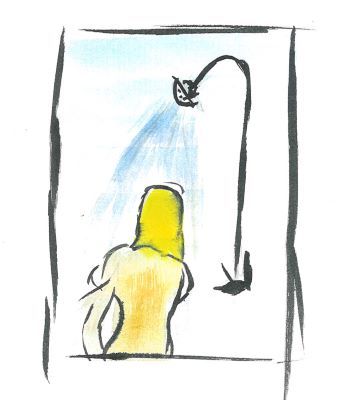
Why saving energy in the bathroom matters:
First, let's talk about why it's important to save energy when we're in the bathroom. The warmth we need for baths and showers often come from energy sources that can harm the environment. By using less energy, we can help keep our planet healthy.
A bath can be really relaxing, but you need a lot of water and energy to heat that water.
- Use less water: Try to fill the tub only as much as you need. The less water you use, the less energy it takes to heat it up.
- Use a stopper: Make sure the drain stopper works well, so water doesn't escape while you're soaking.
- Enjoy warm, not hot water: You don't need super hot water to have a nice bath. Warm water is just as relaxing and uses less energy.
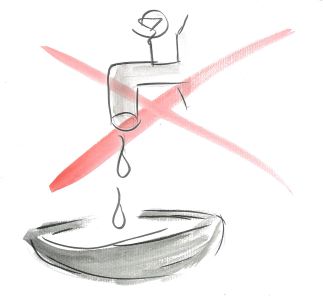
Taking smart showers:
Showers are a quick and efficient way to get clean, but we can still save energy while enjoying them:
- Install a low-flow showerhead: It use less water while still giving you a good shower. You'll save water and energy.
- Don't let it run: While you're in the shower, turn off the water when you're not using it, like when you're soaping up or shampooing your hair.
- Time yourself: Try to keep your shower time reasonable. Shorter showers use less water and energy.
- Not too hot: Dermatologists say that taking a shower at a slightly cooler temperature is good for the environment and our skin
- Use cold water for short uses, like brushing your teeth or washing your hands. By the time it gets warm, the process is usually done, and the warm water just sits in the tap and cools down.
3. Saving Energy with Your Refrigerator
Why Your Fridge Matters:
Your refrigerator keeps your food fresh and safe to eat. But it also uses energy to do its job, and that energy often comes from sources that can harm our planet. By using less energy with your fridge, you can help protect our environment.
Here are some cool tips to save energy:
- Check the temperature:
Your fridge doesn't need to be super cold. Set the temperature to around 6-8°C) and the freezer at -18°C. That's cool enough to keep your food safe. - Keep It full:
A well-stocked fridge stays cool more efficiently. But don't pack it too tight; you need some space for air to circulate. - Seal it tight:
Check if the fridge door seals properly. If not, cold air can escape, and your fridge has to work harder - Let food cool before storing:
Don't put hot leftovers or warm food directly into the fridge. Let them cool down first to save energy. - Cover your food:
Cover or wrap your food before putting it in the fridge. Uncovered food releases moisture, making the fridge work harder. - Defrost regularly:
If your fridge or freezer has ice buildup, it's time to defrost. Ice makes your fridge less efficient. - Clean the coils:
Dust and dirt can collect on the coils at the back of your fridge. Gently vacuum or wipe them clean to help it run better. - Keep it away from heat sources:
You shouldn't put a refrigerator next to a heat source or use it to cool down a heat source. So, wait until hot food has cooled down before putting it in the fridge. - Upgrade if it’s old:
If your fridge is really old and not energy-efficient, it might be time to consider a new one. Newer fridges use much less energy.
4. Saving energy with your deep freezer
Why Your Deep Freezer Matters:
Your deep freezer is like a frozen treasure chest, keeping your ice cream, veggies, and more at their chilly best. But, it uses energy to stay frosty, and that energy often comes from sources that can harm our planet. By using less energy with your deep freezer, you can help protect our environment.
Here are some easy tips to make your deep freezer more energy-efficient:
- Set the right temperature:
Your deep freezer doesn't need to be super cold. Set it to around -18°C, that's chilly enough to keep your food frozen solid. - Don't open the freezer too often:
The cold air can get out of the freezer more often when you open it. The warm air comes in at the same time. This means that the freezer needs to use energy again to cool down. You should open the door quickly and less often. - Seal the lid tight:
Check if the lid seals tightly when you close it. If not, cold air can escape, and your deep freezer has to work harder. - Freeze Food Properly:
When you're freezing food, make sure it's in airtight containers or freezer bags. This prevents freezer burn and keeps your food fresh. - Defrost when needed:
If ice builds up inside your deep freezer, it's time to defrost. Ice makes your freezer less efficient. With a one-centimeter layer, consumption can go up by as much as 15%. - If your deep freezer is too big for your needs, it uses more energy than necessary. If you only put a small amount of food in the fridge, 50–80 litres is enough.
5. Saving energy when washing dishes
Why saving energy while washing dishes matters:
When we use hot water and electricity to wash our dishes, we often use energy sources that can harm our planet. By using less energy, we can help protect our environment.
Here are some easy tips to make washing dishes more energy-efficient:
- Scrape, don't rinse:
Before loading your dishes into the dishwasher or sink, scrape off food scraps instead of rinsing them with hot water. This saves water and energy. - Wait for a full load:
Whether you're using a dishwasher or washing by hand, try to wait until you have a full load of dishes before starting. It's more efficient to wash many dishes at once. - Choose the ECO programme:
Most dishwashers have a "green" or "ECO" setting. This setting saves money because the dishes are washed at a cooler temperature. The ECO plan runs longer than other programmes, but it still saves electricity because it heats the water less. - Use water softeners:
For cleaning to work well, the water must be soft and low in lime. When the water is hard and chalky, the dishwasher won't work as well and will break down faster.
6. Saving Energy When Doing Laundry
Washing and drying our clothes often use electricity and hot water, which can harm our planet. By using less energy, we can help protect our environment.
Follow these simple steps to save energy when doing laundry: 
- Wait for a full load: Try to wait until you have a full load of laundry before starting the washing machine. Washing many clothes at once is more efficient.
- Choose the lowest temperature: How do you decide which temperature to choose?
- 30 degrees for clothes that aren't too dirty.
- 40 degrees for hard-to-remove dirt
- 60 degrees are needed only if there is a chance of illness in the home, such as with gastrointestinal diseases
- Skip the Pre-wash: Putting the clothes through a pre-wash wastes too much energy and it doesn't generally make things cleaner. If you have to deal with dirt or spots that are hard to get rid of, pre-treat them before washing.
- Choose a shorter cycle: Many washing machines have shorter cycles that use less energy. Pick the shortest one that gets your clothes clean.
- Use the right amount of detergent: Follow the instructions on your detergent bottle to avoid using too much. Using too much detergent can make the washing machine work harder.
7. Smart ways to save energy while cooking
- Use the right pot or pan:
Pick a pot or pan that fits the size of your burner. If it's too big, you're wasting heat. If it's too small, you're wasting energy. - Keep lids on:
When you're cooking on the stovetop, keep the lids on your pots and pans. This traps the heat and helps your food cook faster. - Use flat-bottomed cookware:
Flat-bottomed pots and pans make better contact with the burner, which means they heat up more efficiently. - Cook with less water:
When boiling veggies or pasta, use just enough water to cover them. More water means more energy needed to heat it up. - Use the leftover heat:
After the water has boiled, reduce the heat, then turn it off a few minutes before the end and keep cooking with the leftover heat. - Don't heat up the oven.
For many meals, you don't need to heat up the oven first. Switch to hot air instead of top and bottom heat. Hot air distributes the air in the oven more widely, so you can set the temperature about 20 degrees lower than what the recipe says.
8. Lighting - bright ideas for saving energy at home
- Turn off lights when you leave:
When you leave a room, switch off the lights. It's easy to forget, but it saves a lot of energy.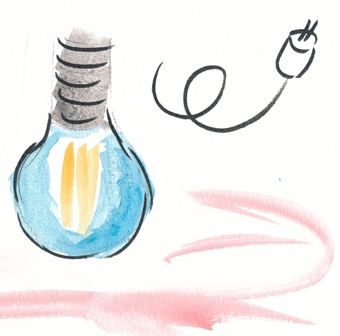
- Use only LED bulbs:
Swap out old, energy-hungry incandescent bulbs for LED bulbs. They use way less energy and last much longer. - Use Natural Light:
Open curtains or blinds during the day to let in natural sunlight. It's free and eco-friendly! - Install Motion Sensors:
In places like closets, hallways, or bathrooms, install motion sensors. They turn on the lights when someone's there and off when they leave. - Use Task Lighting:
Instead of lighting up an entire room, use task lighting. For example, a desk lamp can give you enough light to read or work without brightening the whole space. - Avoid dark lampshades:
If you use dark lampshades, here comes the bad news: they absorb your light. So use light lampshades that reflect valuable light.
9. Saving Energy with Household Electronics
Why Saving Energy with Electronics Matters:
Most of our household gadgets use electricity, and where that electricity comes from can harm our planet. By using less energy, we can help protect our environment and keep the world powered up in a greener way.
Here are some smart tips to save energy with household electronics: 
- Unplug when not in use: When you're not using your electronics, like the TV or computer, unplug them. Even when turned off, they can still use a little energy if they're in standby mode. Every household wastes as much energy in standby mode as five energy-saving lamps consume in continuous use. You would never leave those five lamps burning day and night for a whole year. So switch off the standby mode. E.g. with a power strip.
- Use a power strip: Plug several devices into one power strip. When you're done using them, turn off the strip to cut off the power completely.
- Choose Energy-Efficient Appliances: When buying new appliances, look for the ENERGY STAR label. These are designed to use less energy.
- Charge smart: When charging your phone or other gadgets, unplug them once they're fully charged to avoid wasting energy.
- Game consoles such as Xbox and Playstation burn over 100 Watts in operation. In addition, the standby mode of new game consoles swallows an enormous amount of electricity. So much, that Sony and Microsoft consoles can consume more power in standby mode over the course of a year than during actual gaming.
Conclusions
There you have it! You can still enjoy a cosy home, your shower or a well-lit home while being kind to the environment. By following our easy tips, you're not only saving energy and money but also helping protect our planet. So, remember these bright ideas to stay green.
Thank you for reading!!
